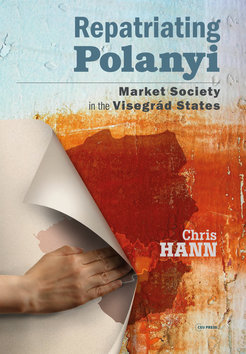Exposing neoliberalism in Karl Polanyi’s home region
Interview with Chris Hann about his new book
On 23 September 2019, the Karl Polanyi Center for Global Studies, directed by Attila Melegh at Corvinus University, Budapest, will organize a launch-event for "Repatriating Polanyi. Market Society in the Visegrád States" by Chris Hann. Mihály Sárkány, Joanna Mroczkowska, Iván Szelényi and Gergely Pulay will take part as commentators. Margit Feischmidt will chair the discussion.

We talked with Chis Hann prior to the launch in Budapest and asked him some questions about the book:
Chris, what is the topic of your book "Repatriating Polanyi: market society in the Visegrád states"?
The book is a medley of themes I‘ve explored over the last three decades in provincial locations in Hungary and Poland. The first half focuses on economy, in particular the dissemination of the market principle after 1990 and the transformation of property relations with the dissolution of agricultural collectives. The second half opens up to analyse themes such as civil society, public rituals, ethnicity and nationalism. These chapters are framed by new materials in which I argue that the perspective of Karl Polanyi can help us to understand the current situation in this part of the world – including blatant and insidious forms of state interference in market processes, and the rise of „populism“.
What do you find particularly interesting about Polanyi?
His major work The Great Transformation was published in 1944. It is the most celebrated analysis of how the economic liberalism of the nineteenth century led to social „disembedding“ and then to „countermovements“ that included Fascism. Like many other social scientists, I find this approach pertinent to the rise of neoliberalism in the last half-century. So far not many scholars have applied Polanyi’s ideas to the region of Central Europe where he grew up before the First World War, so that is the gap I try to fill in this book as a social anthropologist.
How long have you been studying market societies in Eastern Europe?
Well, Hungary practised a form of „market socialism“ from the 1960s onwards. My beginning was a Summer University course I took in economics in August 1974, shortly after graduating from Oxford. The institution now called Corvinus University of Budapest was then known as the Karl Marx University of Economics. But in spite of the name, many Hungarian economists were already applying Western (neoclassical) models. A widespread enthusiasm for markets among liberal „experts“ played a significant role in what I believe to be hasty, misjudged, privatization and marketization strategies after 1990.
How did the book come about?
I selected the articles previously published and wrote first drafts of the new chapters during a sabbatical year at the Institut d´Études Avancées in Nantes in 2013–2014. Events in Hungary the following year, notably the so-called „migrants‘ crisis,“ delayed completion of the Manuscript. I was very pleased when it was accepted by the Central European University Press, especially as I am critical of the consequences of the “ideological” liberalism which in a certain sense the Central European University has represented since its inception.
What new insights does the book offer?
It should at least correct some illusions, e.g. that more market and private property are the unambiguous keys to a liberal and tolerant „civil society“. It should make readers suspicious of the very term civil society, when it is marked by disembedding processes such as those that effectively compel hundreds of thousands of young people to migrate abroad in search of decent jobs (while their impact on the labour market breeds resentments elsewhere, notably in Britain, as we saw in the Brexit referendum). But the book is not just negative and its message does not depend on the particularities of the villages and small towns where I have worked as an anthropologist. I argue for an alternative to neoliberal hegemony and the lurch to populism, namely a return to familiar principles of social democracy or „embedded liberalism“, but at the level of Europe and Asia combined. This is the sense in which I use the term Eurasia. But perhaps I need to write another book to explain the notion of „social Eurasia“ more clearly, and how it might be institutionalized in a Polanyian sense.
For whom is the book likely to be of interest – who should read it?
Scholars specialized in the region it covers, of course. But with luck also more general audiences, anyone interested in a perspective that differs from that offered by journalists and other social scientists, who rarely venture far from capital cities and do not interact with „ordinary citizens“ in the way we anthropologists do.
